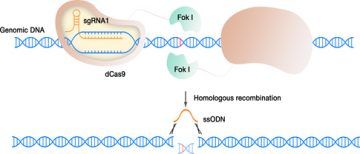Feng and Gilbert in Nature:
 Suitable protein targets are needed to develop new anticancer drug-based treatments. Writing in Nature, Behan et al.1 and Chan et al.2, and, in eLife, Lieb et al.3, report that certain tumours that have deficiencies in a type of DNA-repair process require an enzyme called Werner syndrome ATP-dependent helicase (WRN) for their survival. If inhibitors of WRN are found, such molecules might be promising drug candidates for further testing.
Suitable protein targets are needed to develop new anticancer drug-based treatments. Writing in Nature, Behan et al.1 and Chan et al.2, and, in eLife, Lieb et al.3, report that certain tumours that have deficiencies in a type of DNA-repair process require an enzyme called Werner syndrome ATP-dependent helicase (WRN) for their survival. If inhibitors of WRN are found, such molecules might be promising drug candidates for further testing.
Imagine a scenario in which scientists could perform an experiment that reveals how almost every gene in the human genome is dysregulated in cancer. Even better, what if such an investigation also offered a road map for how to select a target when trying to develop treatments that take aim at cancer cells, but are non-toxic to normal cells? A type of gene-editing technology called CRISPR–Cas9 enables just that in an approach termed functional genomics. Using this technique, the function of almost every gene in cell-based models of cancer (comprising human cells grown in vitro or in vivo animal models) can be perturbed, and the effect of each perturbation on cancer-cell survival can be measured.
CRISPR can be used to mutate, repress or activate any targeted human gene4,5. In functional genomics, gene function is assessed in a single experiment by growing a large number of cells and then perturbing one gene in each of the cells.
More here.
